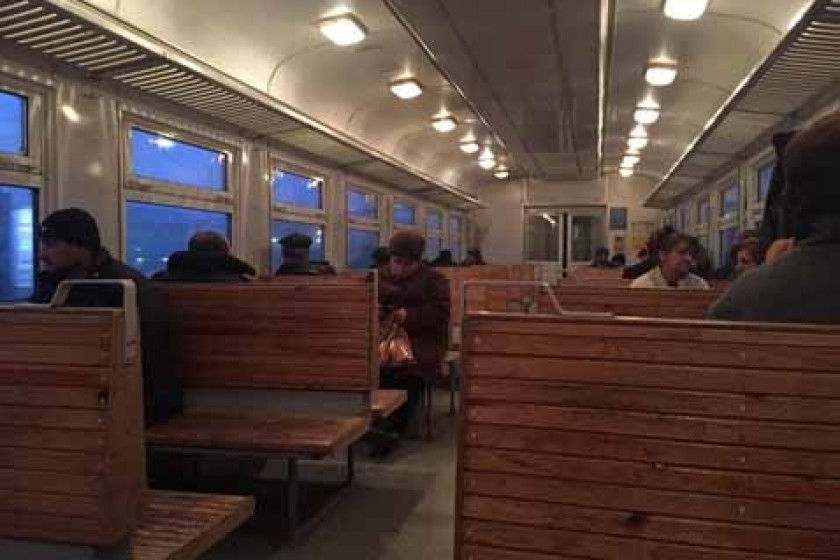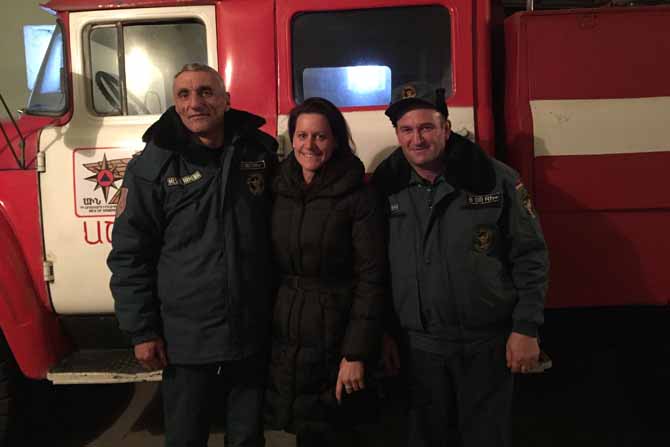
Diasporan Volunteer’s Journey in Armenia: Los Angeles Firefighter Paramedic Teaches First Aid in Villages
By Jamie Kolar
It’s January, I'm standing on a platform in Yerevan waiting to board an 8 am train to Gyumri.
It's cold and I brought along my Thermos coffee mug, an American habit that makes me stand out in a country where coffee isn't a morning caffeine fix but rather a social drink to be enjoyed with others.
I am on my way to bring donated medical equipment to the Gyumri Ambulance Service, something I have been doing since the summer of 2013 when I first started volunteering at the ambulance company teaching emergency trauma care.
The train has wooden bench seats that face each other. Just inside the door I find two empty seats, one to stack my gear on, and the other one to sit on. I settle in with my book for the three hour ride.
About an hour into the train ride, a group of women board the train at a stop near Dalarik Village with boxes of fresh herbs they are planning to sell in Gyumri. All four of them slide into the bench seats where I am sitting pushing me toward the window, I learned a while ago that the American standard of personal space is not a concept here. Before their village is even out of sight they've laid out a breakfast between us of fried potatoes, cheese, sliced meats, boiled eggs, pickled vegetables, herbs, and bread. Losing focus on my book, I watch the women out of the corner of my eye grabbing different bits of food to fill the pockets they have formed into their bread.
One lady has put an assortment of food on a makeshift plate, using the lid from the pot of potatoes. She startles me when she pushes the plate into my line of view right between the book and my face. "Eat," she tells me, more of a command than a question. I politely decline, but before they even respond I already know how this will play out.
After having lived in Armenia for a year, I've lost track of the number of times I've been invited by strangers to share a meal with them. Even times when I was legitimately full, I was no match for an Armenian grandmother’s persistence that I should still eat more. Sitting between the window and their breakfast spread, I know there is no way off this train without first enjoying some Armenian hospitality. So I join them in their meal and try my best to use my new Armenian language skills to join their conversation. I want to take a photo of the whole scene for when I share this story with my friends back home in Los Angeles, but I don't know how to do it without these women noticing. Even if I could get the photo angle I want, I could never truly capture the real essence of this moment.
After finishing up my trainings with the ambulance service in Gyumri, I take a taxi up to the town of Ashotsk to stay with a host family at a bed in breakfast. Ashotsk is about 30km north of Gyumri, one of the coldest villages in Armenia and consequently, is home to past and present Armenian Olympic cross-country skiers.
I met the family I am going to stay with during an excursion I took with Birthright Armenia last year and I am excited about getting to spend more time with them on my own. Cross-country skiing has always been the main focus in the lives of this family of four. The mother and father, Alla and Artur, both represented Armenia in the Olympics during the 80s and 90s, their oldest son Sergey competed in the last winter Olympics in Sochi. We are in the middle of the competition season, so on this trip I am staying with only Alla and her younger son Mika, because Artur is coaching Sergey at an international race in Moscow.
I am accustomed to visiting Armenian villages, last year I went to over 20 villages teaching first aid with Aid to Armenia, but on all those trips I was accompanied by a translator. Now I will be putting my language skills to the test staying a few days in Ashotsk on my own. Before the trip I told my friend Anahid that I was excited to be taking my first village trip without a translator but also nervous about how well I would be able to communicate. Her response was "your Armenian is just fine and as they say, "lezud k-batsvi" (literal translation,“your tongue is going to open up”).
Sitting in the back of the taxi staring out the window at the snow covered hills I am willing my tongue to relax, wondering if it will somehow help it to "open up". The trip is fairly short and I arrive just before lunch, not that it really matters what time I arrive because I will be welcomed with food at any time of the day.

On this trip to Ashotsk I am planning to visit the Ashotsk Fire Station. I did volunteer work in 2013 with the Yerevan Fire Department teaching emergency medical care, but my real motivation for this visit is personal. I am a firefighter paramedic for Los Angeles County Fire Department and I want to meet the guys that work here in Ashotsk.
The high stress nature of firefighting creates a bonding atmosphere that makes your co-workers more like family. It is a universal connection that goes beyond state and country borders.
However, in Armenia I am a bit of an anomaly, I am a female firefighter, something that hasn’t caught on here yet. So I come to the station armed with photos and stories to prove that I really am “one of the guys.”
The fire station is a 2km walk from the house I am staying at. I show up unannounced, a surprise I am sure for a town that rarely sees American tourists on their streets. Two men are standing outside smoking when I arrive.
After explaining that I am a firefighter from Los Angeles, I am taken straight into the Chief’s office. Chief Radik greets me and despite looking confused as to why I am here, immediately offers me a seat and a cup of coffee. I show him a few photos of my fire engine and of me fighting fires in LA. I can tell his demeanor is changing from confusion to excitement.
Now the real challenge begins, he understands that I am here to share stories and the accelerated speed at which Armenian is running off his tongue leaves me, no doubt, with a stressed look on my face. “Knerek, chem haskanum” (sorry, I don’t understand), I can see the wind immediately go out of his sails, realizing he won’t be able to share all the stories he has already lined up in his head. Despite my elementary Armenian skills, I have gotten my personal introduction down pat, something that initially leads people to think that my Armenian conversational skills are better than they are. We both become very aware of the silence in the room and divert our attention to drinking coffee. This is an awkward silence I have gotten used to, having immersed myself in rural Armenia long before learning the language.
Chief Radik gets up and leaves the room, I am thinking that maybe there is someone he knows who speaks English and he is going to bring him back to translate. After a few minutes he comes back into the room holding a memory stick up for me to see. Over the next hour, we scroll through different photos and video clips from emergency related activities in the Shirak region where Ashotsk is located.
Communication is slow and difficult, but the pictures help us and Radik is very patient explaining things multiple times, ending each sentence with “Haskatsar?” (Understand?).
When we have gone through all the photos on his computer and exhausted all the Armenian I know, I put on my coat to head out. Before I leave I pull an LA County Fire patch out of my coat to give to him, trading patches is a tradition when visiting fire stations. Generally, different stations will design a patch to represent the area that they work in.
In Armenia, all of the fire stations have the same patch, so I can’t imagine they have much use for patch trading, but as soon as I hand him the patch he goes into his drawer and pulls out a patch for me. He signs and dates the back of the patch and then asks me to do the same for the patch I have given him.
He gives me a tour of the station and then we head outside, it is dark so the chief insists that he walk me home. On the walk home we stop in a market where he proceeds to buy a box of fancy chocolates for me. I tell him it isn’t necessary, that I am very happy with the gift of the fire patch that he has given me.
I don’t want him to spend his money on me, yet I know that it would be worse for me to deny his gift, so I accept it. I can see this pleases him. Armenians take such pride in ensuring their guests are treated well and a gift of some sort is usually part of that hospitality. I have been welcomed, treated warmly and been given a gift, so he knows that Ashotsk and his fire station are going to be fond memories cemented in my mind.
These spontaneous encounters, where I find myself being not only accepted but warmly welcomed into the Armenian culture, are the central reason I have become so emotionally invested in Hayastan: an investment that has driven me to start Aid to Armenia to advance emergency medical care in rural Armenian areas. T
These are just a few of the many stories that I could share about my time spent in Armenia. Each encounter is unique and memorable in its own way, but there is a common theme of hospitality and generosity in all of them.
For many Armenians, especially those living in rural communities, life is a daily struggle to survive but I have learned first-hand that their greatest joy comes from giving to others.
Jamie Kolar is a firefighter paramedic and a third generation Armenian living in Los Angeles. Recently, she took a year sabbatical from her job and spent it in Armenia as a volunteer to train ambulance, fire brigade personnel, and families in rural Armenian communities in advance emergency medical care. Only 6 months after she returned she felt the inner draw to go back to Armenia on her two week vacation. As usual it was a memorable and heartwarming experience. With this article, she would like to share a few of the experiences from my January trip with Hetq’s readers.
Top Photo: The train car on the way to Gyumri
 Videos
Videos Photos
Photos




Comments (7)
Write a comment